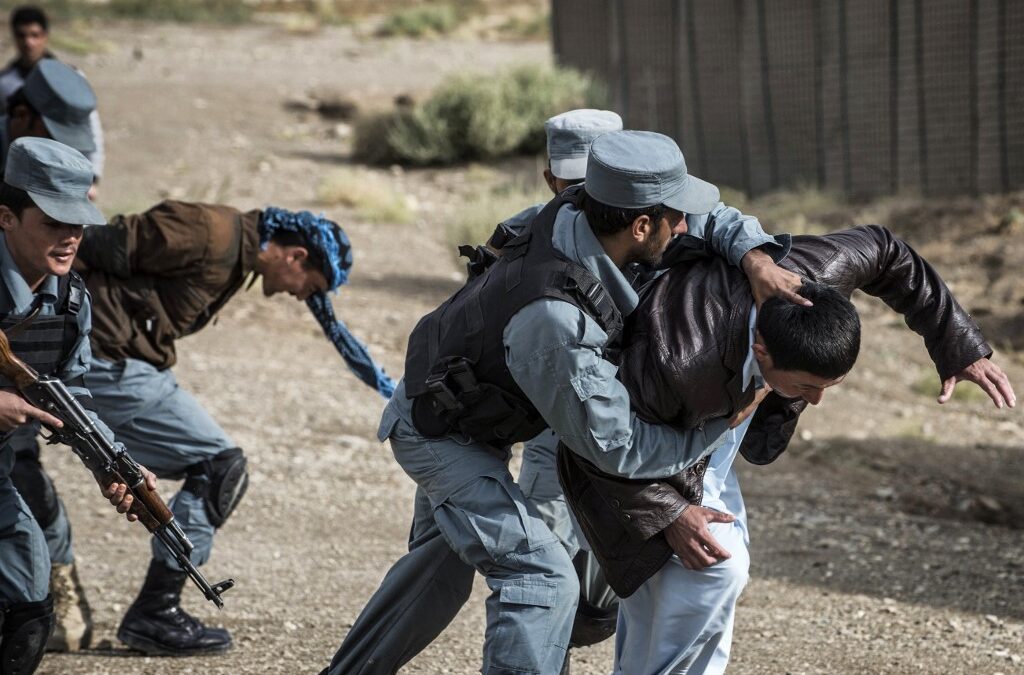A viral video that has been making the rounds on social media in French-speaking African countries since early April claims that the force enjoys total “immunity” and can operate “in any country without having to ask for authorisation from the state involved”. These claims come against an African backdrop of distrust of Western countries like France, the continent’s former colonial power. Yet, there is nothing secret about EuroGendFor, nor does it have immunity or the right to deploy without the consent of the host country, according to the treaty that established the force, as well as an expert interviewed by AFP.
“LISTEN UP,” reads the caption to a eight-minute video shared on Facebook. The woman interviewed in the clip, who gives her name as Sylvie Charles, claims there is a gendarmerie force called EuroGendFor that was born out of “NATO’s secret armies” and established by several European countries. The force enjoys total immunity, she claims without elaborating, and can “operate in any country without having to ask for authorisation from the state involved”.
She claims the force can be found today “in Mali, Yemen. They operate outside of protocol and are found to have ties with terrorists.”

The video has been shared nearly 10,000 times on Facebook in Africa since April 8. Similar claims about EuroGendFor had already appeared in France in late March, showing up on TikTok and Facebook.
On African social media, some Internet users claimed that the “secret army” would intervene in Mali and “pose problems for the local population and leadership”.
The rumour comes against a backdrop of tension between certain African countries and Western powers. “The media (doesn’t mention EuroGendFor) and the UN accuses Russia’s Wagner group of illegally supporting the armed forces loyal to Mali, Burkina and the CAR,” the internet users claim, referring to accusations made against the Russian paramilitary group by independent experts commissioned by the UN.
For their part, the colonels in power in Bamako portray the Russian forces present on Malian soil as military “instructors”.
While legally speaking EuroGendFor is indeed a gendarmerie force, it is far from being a secret army whose members can deploy anywhere and have total immunity from prosecution.
EuroGendFor explained
EuroGendFor was set up in 2004 by five members of the European Union — France, which first proposed the idea, along with Italy, the Netherlands, Portugal and Spain — according to the declaration of intent available on its website.
As mentioned in the Velsen treaty that established EuroGendFor in 2007 — and as its name implies — it is a force “exclusively comprising elements of police forces with military status of the Parties, in order to perform all police tasks within the scope of crisis management operations.” Its headquarters are located in Vicenza, Italy.
The High Level Interdepartmental Committee (CIMIN), “made up of representatives of the appropriate ministries from every member of EuroGendFor, gives political-strategic direction to the force” and the decisions are taken unanimously, wrote Franck Durand, a researcher specialising in security and defence law at the University of Reims, in an article for the European Union Review in 2018.
Today, EuroGendFor is made up of forces from seven EU members: Spain’s Civil Guard, the French National Gendarmerie, Italy’s Carabinieri, the Royal Netherlands Marechaussee, Portugal’s National Republican Guard, the Romanian Gendarmerie and Poland’s Military Gendarmerie. A special Lithuanian force — the Public Security Service — is a partner, while the Turkish Gendarmerie has observer status.
It is worth noting that despite its name, the force is not an organ of the European Union and is “dedicated to external crisis management,” as mentioned on the French interior ministry website — even if it was created in order to strengthen the bloc’s Common Security and Defence Policy, the EU’s main strategic instrument.
“When it comes to the various conflicts around the world, some crises are so severe that military interventions are necessary to reestablish order and the normal functioning of administrative structures. Armed forces are sent, and then the next phase is to restore social life, which is more of a mission for the police. The benefit of the European gendarmerie force is that it has this dual competence — military and police — which is what allows it to intervene at the pivotal moment when order and social life is being restored in a country,” Durand told AFP on April 11.
He added that EuroGendFor can set up “expeditionary forces for special expeditions”. The gendarmes who take part do so voluntarily and receive special training.
Deployments and types of engagement
According to its website, EuroGendFor has deployed to eight countries since 2007, when it first did so to Bosnia and Herzegovina. Since then it has been notably deployed to a few African countries including the Central African Republic (several missions since 2014), Libya (in 2016) and Mali (two missions since 2014).

Durand said that to his knowledge, EuroGendFor is no longer present “as a European force” in Africa. Certain EuroGendFor gendarmes were, according to him, still present “alongside French forces” in Mali right up till the Barkhane withdrawal in August 2022. AFP reached out to EuroGendFor regarding its current deployments but had yet to hear back at the time of publication.
Contrary to what the viral video claims, EuroGendFor cannot deploy to “any country without having to ask for authorisation from the state involved”. Article 6 of the treaty signed by the founding members, states that the “stationing and deployment on the territory of a third State shall be covered by an agreement between the Sending States and the third State specifying the conditions of such stationing and deployment, bearing in mind the fundamental principles of this Treaty”.
“If the states involved signed an agreement, then that means there was a discussion between them,” said Isabelle Pingel, a member of the Sorbonne Research Institute for International and European Law (IREDIES). It is therefore not possible for EuroGendFor to deploy to a country without an invitation. Not to mention that “international law forbids it,” Pingel told AFP on April 12.
“Under no circumstances can EuroGendFor operate on a country’s territory without its consent,” said Durand, adding that EuroGendFor cannot “intervene on its own initiative but must operate under the mandate of an international organisation requesting its deployment — the UN, NATO or the EU” or that of a coalition force.
In Mali for example, EuroGendFor was deployed in 2014 under an EU mandate — the European Union Capacity Building Mission in Mali (EUCAP Sahel Mali) — to support the internal security forces. EuroGendFor’s gendarmes were tasked with “advising at a strategic level and training”, according to its website. In 2018, nine EuroGendFor experts in charge of mentoring and training Malian forces arrived in Mali, this time as part of the UN mission MINUSMA.
As for the “immunity” supposedly enjoyed by members of EuroGendFor — a legally vague claim interpreted by African internet users to refer to potential abuses committed in the countries of intervention, like the allegations against Wagner — there is no mention of such a thing in the founding Treaty of Velsen.
In fact, it appears that it might actually be “the opposite,” said Pingel. Article 25 of the treaty sets out the jurisdictional and disciplinary terms, providing many examples, including when the two sides — the country sending the forces and the one receiving them — have a concurrent right to exercise jurisdiction.
“EuroGendFor is not entitled to any legal immunity regarding its operations,” said Durand. “At most it can negotiate — as is the case for most civilian or military operations on foreign territory — agreements determining attribution of jurisdiction in case of any crimes or misdemeanors committed by individual members of said forces,” he added.
Recurring rumours
EuroGendFor had already been hit by previous rumours that it was involved in various operations in Europe, including to put down demonstrations in Greece and France. Already in 2012, an article on a blog known for spreading misinformation claimed that EuroGendFor was “ready to deploy in Greece, its first major operation against the population of a European state”. Greece was at the time in the throes of a government-debt crisis.
“EuroGendFor resolves various problems for European governments,” the author of the article claimed, adding that governments can “use firearms against the people” via the force’s gendarmes. Meanwhile “EuroGendFor cannot be prosecuted,” the author added.
There were similar claims in France during the yellow vest protests in 2018 as well as the demonstrations against the vaccine pass in 2022. Photos shared at the time — and debunked by AFP — included the claim that EuroGendFor was involved.
Concerns over EuroGendFor — their means of intervention and assumed “immunity” — have also been the subject of questions submitted to the European Parliament over the years (in 2008 and 2011, for example), to which the institution responded by recalling the Velsen treaty provisions.
Linked to a conspiracy theorist
The viral video that has been making the rounds on social media in Africa was taken from a longer interview of just over an hour that was posted to the YouTube channel Unis-Vers TV.
In order to identify Sylvie Charles, who appears in the video without any mention of her job or title, AFP uploaded a screenshot from the video to PimEyes, a facial recognition search engine.
AFP found that she had notably appeared in a video posted to the YouTube channel Morpheus in December 2021, in which she notably mentions legal problems and a court in Lille, France. A Google search of those keywords turns up a website with a letter that she claims to have sent to the Palais de Justice courthouse in Paris at the end of 2021.
In this rambling 11-page letter, she notably accuses the French government of identity theft “in criminal cases of financing terrorism, money laundering and embezzlement of public funds” and claims that her father was assassinated in 2010 “to protect the criminal activity” of French authorities. She also brings up EuroGendFor, which she describes as “an unconventional secret army,” among a jumble of other topics.
We also discovered that she had appeared in a livestream in April 2022 co-hosted by Hayssam Hoballah, whom the French daily Liberation had earlier identified as a conspiracy theorist.
“This YouTuber could pass for an eccentric who claims to provide healing through raw food, massages, and Argentine tango,” Liberation wrote at the time. “But more than anything he’s a conspiracy theorist who believes that the ‘globalists’ created Covid and that children are kidnapped by the powerful as sacrifices.”
Marin Lefevre
Translated by Anna Maria Jakubek

- Home
- About AFP
- How we work
- Editorial & Ethical standards
- Fact-Checking Stylebook
- Meet the team
- Training
- Subscribe
- Contact
- Corrections
Copyright © AFP 2017-2023. All rights reserved. Users can access and consult this website and use the share features available for personal, private, and non-commercial purposes. Any other use, in particular any reproduction, communication to the public or distribution of the content of this website, in whole or in part, for any other purpose and/or by any other means, without a specific licence agreement signed with AFP, is strictly prohibited. The subject matter depicted or included via links within the Fact Checking content is provided to the extent necessary for correct understanding of the verification of the information concerned. AFP has not obtained any rights from the authors or copyright owners of this third party content and shall incur no liability in this regard. AFP and its logo are registered trademarks.
